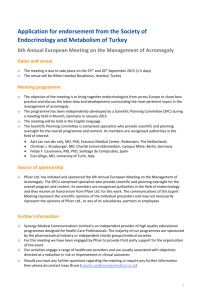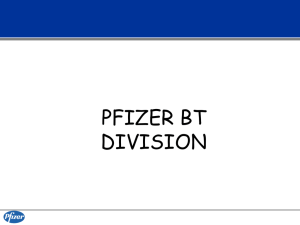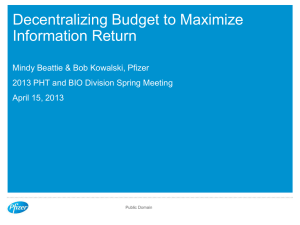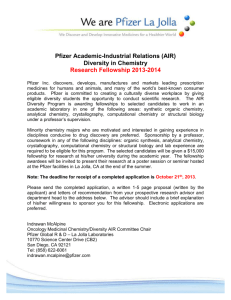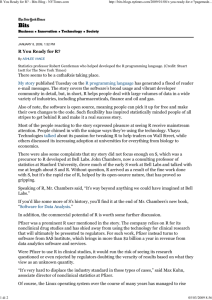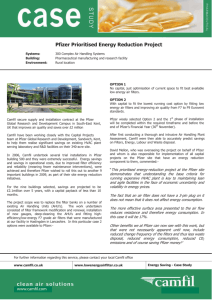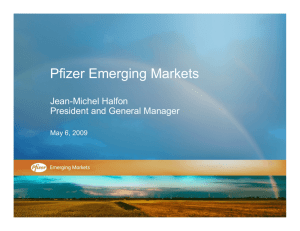Worldwide Tax Daily by Andrew Velarde
advertisement
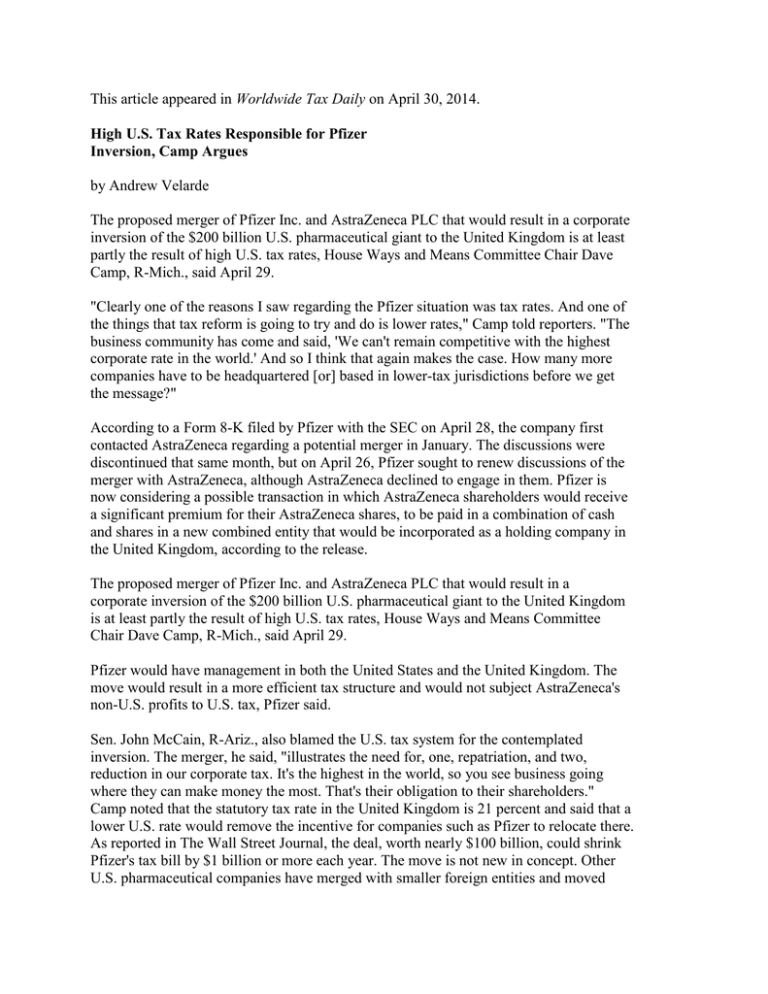
This article appeared in Worldwide Tax Daily on April 30, 2014. High U.S. Tax Rates Responsible for Pfizer Inversion, Camp Argues by Andrew Velarde The proposed merger of Pfizer Inc. and AstraZeneca PLC that would result in a corporate inversion of the $200 billion U.S. pharmaceutical giant to the United Kingdom is at least partly the result of high U.S. tax rates, House Ways and Means Committee Chair Dave Camp, R-Mich., said April 29. "Clearly one of the reasons I saw regarding the Pfizer situation was tax rates. And one of the things that tax reform is going to try and do is lower rates," Camp told reporters. "The business community has come and said, 'We can't remain competitive with the highest corporate rate in the world.' And so I think that again makes the case. How many more companies have to be headquartered [or] based in lower-tax jurisdictions before we get the message?" According to a Form 8-K filed by Pfizer with the SEC on April 28, the company first contacted AstraZeneca regarding a potential merger in January. The discussions were discontinued that same month, but on April 26, Pfizer sought to renew discussions of the merger with AstraZeneca, although AstraZeneca declined to engage in them. Pfizer is now considering a possible transaction in which AstraZeneca shareholders would receive a significant premium for their AstraZeneca shares, to be paid in a combination of cash and shares in a new combined entity that would be incorporated as a holding company in the United Kingdom, according to the release. The proposed merger of Pfizer Inc. and AstraZeneca PLC that would result in a corporate inversion of the $200 billion U.S. pharmaceutical giant to the United Kingdom is at least partly the result of high U.S. tax rates, House Ways and Means Committee Chair Dave Camp, R-Mich., said April 29. Pfizer would have management in both the United States and the United Kingdom. The move would result in a more efficient tax structure and would not subject AstraZeneca's non-U.S. profits to U.S. tax, Pfizer said. Sen. John McCain, R-Ariz., also blamed the U.S. tax system for the contemplated inversion. The merger, he said, "illustrates the need for, one, repatriation, and two, reduction in our corporate tax. It's the highest in the world, so you see business going where they can make money the most. That's their obligation to their shareholders." Camp noted that the statutory tax rate in the United Kingdom is 21 percent and said that a lower U.S. rate would remove the incentive for companies such as Pfizer to relocate there. As reported in The Wall Street Journal, the deal, worth nearly $100 billion, could shrink Pfizer's tax bill by $1 billion or more each year. The move is not new in concept. Other U.S. pharmaceutical companies have merged with smaller foreign entities and moved their headquarters overseas. Last July, Perrigo Co., a Michigan-based provider of healthcare products, announced that it intended to merge with Elan Corp. PLC, a Dublinbased biotechnology company, in an $8.6 billion deal that would avoid the anti-inversion rules of section 7874 and move the U.S. company's domicile to Ireland. (Prior analysis .) The Pfizer deal, however, would be much larger than any of those. Bret Wells of the University of Houston Law Center said the proposed Pfizer merger is just another example of capital markets engaging in reactive tax planning based on problematic U.S. tax policy. "Whenever companies see large business combinations they can do with a foreign-based company, that can be a bootstrap for them to become an inverted company," Wells said. "What this should signal to us is that we need to rethink why there is such a disparate tax result difference between how U.S.-based multinationals and foreign-based multinationals are treated." Wells added that attempting to fight those deals by tightening anti-inversion rules such as section 7874 would be too narrow an approach. U.S. tax interests would be better served by protecting the U.S. base from base erosion measures that are available to inbound investors, he said. "Our historic response to the inversion phenomenon has been to try and punish the inversion messenger . . . without correcting the underlying defect that is motivating people to do inversions in the first place," Wells said. He added that if Congress continues to enact stricter anti-inversion rules, inversions will likely continue. "The practicing bar is very creative. Once you set up rules that say, 'We don't want this form of inversion to occur any longer,' but the financial incentives are still so great and compelling, then the bar will repackage their tax planning advice to achieve the same results through mechanisms that can comply with the new legislative rules," Wells said. Wells was skeptical of Camp's assertion that lower tax rates might result in fewer inversions. "When you can set up an entity with a 4 or 5 percent tax rate, we can never lower our rate low enough for that to be the answer," Wells said. Rather, the U.S. should assert taxing jurisdiction over the residual profits that are created domestically and should not allow related-party payments to strip those profits out, he said. Meg Shreve and Luca Gattoni-Celli contributed to this article.
